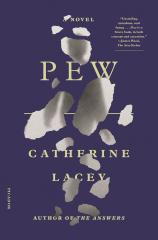Pew
Review
Pew
When the Bonner family --- Hilda, Steven and their three young sons --- arrives in church one Sunday morning, they find a figure sleeping in their pew. Much of the church service goes by before the stranger rouses and silently seems to join in with the prayer. It is decided that the Bonners will take the stranger, who soon comes to be called Pew by the community in which they find themselves, home with them. This latest novel from Catherine Lacey follows the person called Pew among small-town Christians for a week leading up to the ominous and mysterious Forgiveness Festival.
No one can figure out if Pew is male or female, Black or white, a child, teenager or young adult. And Pew isn’t telling. They remain mostly silent, which creates a space for everyone to fill the silence with ruminations and confessions. Pew becomes, for this tight-knit and conservative community, a blank surface upon which to project unease, and a silent receptacle into which they pour their memories and thoughts. As the week goes on, the community’s concern for Pew begins to shift in subtle and then not-so-subtle ways.
"Overall, this is a worthwhile read, both frustrating and compelling, and written with an interesting, quite literary style and a provocative thoughtfulness."
The Forgiveness Festival looms large as each day the people prepare --- anticipating restlessness and even some danger, but promising themselves and Pew that things will be better again when it is over. All the while, Pew philosophizes and observes, allowing readers to gain awareness, if not information, about them. There are glimpses at their past, but not enough to say anything for certain. The few times Pew chooses to answer a question, almost nothing is actually revealed.
As Pew sits, drives, walks and shares meals with various other characters, they learn about them and the community as a whole. Much more is revealed, though it is disembodied, during the Forgiveness Festival. For Pew, however, none of the revelations are salvation, and none of the festival’s ritualized honesty addresses the roots or consequences of racism, gender violence, intolerance or fright. The community, smug in its inaction, continues on its course.
Several ancient religious cultures used scapegoat rituals to cast their sins from their midst. While Pew’s scapegoating in this more traditional sense becomes a bit more understood by the end of this slim novel, by that point it is obvious that Pew has been burdened by the sins of the community the whole week. There is not a lot of clarity in PEW, but there is much insight --- insight into the fluidity of identity, the hypocrisy of the fanatical, the lasting effects of trauma, and the horrific power of hate, fear and complacency. Lacey references other writers and looks obliquely but unblinkingly at issues of race, gender, power and religion in the U.S.
PEW may leave some readers dissatisfied. Because Pew is so enigmatic and Lacey doesn’t allow Pew to be quite anything at all, the already dark story veers to the dystopian, even as it is firmly set in the here and now. There is a lot to unpack and puzzle out in PEW, and readers surely will come to their own conclusions about the culmination of the story. Overall, this is a worthwhile read, both frustrating and compelling, and written with an interesting, quite literary style and a provocative thoughtfulness.
Reviewed by Sarah Rachel Egelman on July 24, 2020
Pew
- Publication Date: July 20, 2021
- Genres: Fiction
- Paperback: 224 pages
- Publisher: Picador
- ISBN-10: 1250798531
- ISBN-13: 9781250798534




